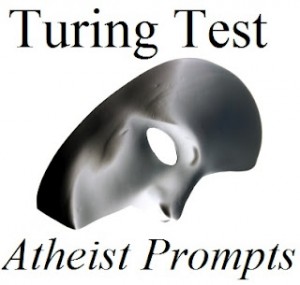This is the thirteenth and final entry in the Atheism round of the 2012 Ideological Turing Test for Religion. In this round, the honest answers of atheists are mixed in with Christians’ best efforts to talk like atheists. It’s your job to see if you can spot the difference. The voting link appears at the end of the entry, and you can look at all entries in this round here.
When (if ever) have you deferred to your philosophical or theological system over your intuitions?
Unlike some other atheists I have spoken to, my intuitions did not initially run toward disbelief, and I spent a number of years as a believer. It was by evaluating my theological beliefs through the lens of rational skepticism over a period of time that my faith began to erode. Eventually I had to admit to myself that my intuition toward belief in supernatural was incorrect. Being habitual about skeptical thinking has effectively altered my natural intuition since then, however, I still struggle at times when I catch myself accepting things without critically thinking about them, mostly because I’m too lazy to follow through or because I find the initial evaluation agreeable to my outlook. It’s incredibly easy to skim through a twitter feed and read an article headline that fits my expectations—that a homeopathic remedy doesn’t work, a GOP pundit is accused of something awful, that George Lucas is trying to ruin Star Wars even worse—and retweet it without reading the full article let alone checking it for accuracy. When I’m aware of this tendency, I try to keep myself more consistent with the skepticism I value, even if it flies in the face of my natural intuition.
Are there people whose opinions on morality you trust more than your own? How do you recognize them? How is trusting them different than trusting someone’s opinion on physics?
I trust no one’s sense of morality more than my own. I do not believe anyone is above moral questioning. However, there are people I admire whose opinions and moral outlook I use as a benchmark for my own. Some of these I grew up with—parents, siblings, cousins—and others are those I’ve befriended over time. I recognize these people by noting shared values, such as kindness, cooperation, and generosity, and by how consistently they exemplify these values to those around them. If someone behaves morally only in a certain context or toward certain types of individuals, they are not truly moral. If one of these morally admired persons were to question the morality of my actions or express a view I question, I would most likely review my own position for consistency, shifting it or reaffirming it as appropriate. Unlike various academic disciplines, such as the humanities or natural sciences, where I can accept an expert’s opinion and trust that the academic body of their specialty has at least somewhat guaranteed that they know what they’re talking about, I don’t believe that someone can be an ‘expert’ on morality, which is why I rank my own moral evaluations as paramount.
Can you name any works of art (interpreted pretty broadly: books, music, plays, poetry, mathematical proofs, etc) which really capture the way you see life/fill you with a sense of awe and wonder? You can give a short explanation or just list a few pieces.
There are many pieces of art and literature from which I’ve found meaning and a sense of awe. Philosophical and moral perspectives are, in my opinion, best presented through the lens of fiction and artistic expression. Art and literature can resonate with a person in a meaningful way by inspiring an emotion (even a negative one), by introducing an unfamiliar concept or view, or by ‘capturing’ or expressing something the viewer could not have themselves articulated. The overall quality and general regard of a piece of art need not determine its value for this either. A person can find meaning in an issue of Spider-man as easily as in Hamlet. I would not exclude religiously inspired works from this, nor religious texts themselves. I’ve spent summers delving into Dante’s Divine Comedy; I’ve stood in awe of Dali’s Christian-themed ‘Galacidalacidesoxyribonucleicacid’; there are verses of the bible I’ve found meaningful, and I need not have faith now to appreciate them still. Art is incredibly valuable because provides people with a common touchstone. By sharing the author’s vision, all viewers can, in discussion of a piece of art, be brought closer together to each other.
Click here to judge this entry, and, once you’ve voted, feel free to speculate and trade theories in the comments or look at other entries in this round.












